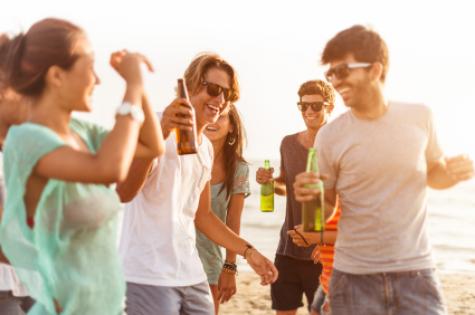A new study from the Boston University School of Public Health suggests younger drinkers often combine caffeine and alcohol.
"Although there have been several articles about alcohol and caffeine use among college students, little was known about this phenomenon among younger adolescents," said Dr Michael Siegel, lead author of the study.
Dr Siegel and his colleagues analysed information from Internet surveys of 1,031 youths aged 13 to 20 years old who'd had at least one alcoholic drink in the past month.
The surveys asked participants whether they consumed energy drinks that contained alcohol and if they mixed caffeine and alcoholic drinks on their own.
The researchers considered traditional caffeinated alcoholic beverages to be alcohol mixed with soft drink, coffee and tea. Non-traditional beverages were pre-mixed alcoholic energy drinks and alcohol mixed with energy drinks or shots.
"Most of the previous studies have focused on the combination of energy drinks and alcohol, but have not studied more traditional combinations such as alcohol and soft drink," Dr Siegel said.
Just over half of the participants reported drinking caffeine and alcohol together in the previous month. Than included 48% of 13- to 15-year-old drinkers, 45% of 16- to 18-year-olds and 58% of 19- and 20-year-olds.
More teens drank traditional caffeinated alcoholic beverages than non-traditional beverages – 46% compared with 20%.
The researchers found teens who had started drinking between age 11 and 13 were more likely to report recently drinking caffeinated alcoholic beverages than those who started later.
The findings suggest mixing caffeine and alcohol is more common among underage drinkers and starts at a much earlier age than previously thought, the research team wrote in the journal Addictive Behaviors.
They found young people who consumed energy drinks and shots mixed with alcohol were several times more likely to binge drink, get in fights and sustain alcohol-related injuries than those who did not.
The same link existed among those who mixed alcohol with soda, coffee and tea, but to a lesser extent.
"This may be due to the fact that energy drinks provide more caffeine than soft drinks or coffee. There appears to be a gradation of effect, with higher amounts of caffeine associated with even higher risks of adverse outcomes," Dr Siegel said.
"Ultimately what's probably happening is that kids who are driven to seek out new experiences push the limits in various ways. Energy drinks fit into that," said Aaron White from the US National Institute on Alcohol Abuse and Alcoholism.
"Energy drinks are a way to be edgy, literally and culturally edgy, and a way to take some chances," White said.
Mixing alcohol and caffeine can mask some of the feelings of intoxication, making teens think they can drink more.
"Caffeine can make you feel like you're less intoxicated. It doesn't reduce your level of intoxication," White said.
While products containing caffeine and alcohol have been taken off the market in some instances, that doesn't stop young people from mixing their own.
"We believe that efforts to educate youth about the adverse outcomes associated with the consumption of alcohol and caffeine are warranted," Dr Siegel said.
"Parents should be aware that underage youth are often adding alcohol to non-alcoholic beverages like soft drink and energy drinks," he added.
"While the dangers of pre-mixed beverages containing caffeine and alcohol have received widespread media attention, we found that the main source of (caffeinated alcoholic beverage) use among youth is self-mixing of caffeine and alcohol," Dr Siegel said.
"These results should become a part of health education programs for teens."



















__small.png)










